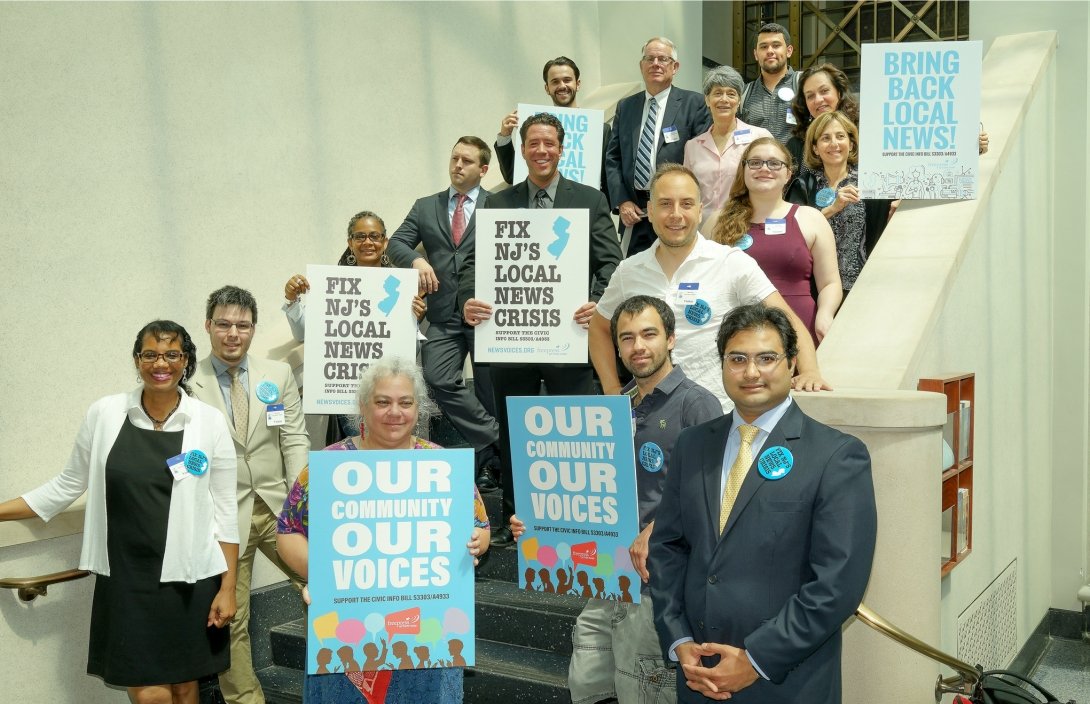Bill to Transform N.J. Media Is Building Momentum

Timothy Karr
In just a few short months, passing the Civic Info Bill — which would transform how New Jerseyans get news and information about their communities — has gone from impossible to achievable.
Here’s what I heard from political insiders and some skeptical members of the media when we launched the campaign to revive and strengthen media in the Garden State: “Lawmakers won’t go for it.” “No one outside of the newsroom cares about the media.” “People are too busy to take action on this issue.”
But when Free Press Action Fund started engaging the public on a radical idea — taking the proceeds from the sale of the state’s old public-media stations to strengthen local media in communities around New Jersey — I started hearing something different.
Support from the public
“The more informed citizenry we have, the more we have civic engagement, the better off we’ll be as a state.”
“The information you need to live your life every day, make political choices, make economic and medical choices, everything from transportation to … [meeting] people in the community, all of that is underscored by local journalism.”
“The public needs to know what’s going on locally, not just nationally. This will keep people engaged and participating in the civic process.”
Getting the Civic Info Bill passed and signed by the state-budget deadline of June 30 was our first shot at turning New Jersey into a leader when it comes to informed communities.
Support from the statehouse
While lawmakers didn’t include the legislation in this budget, key allies in the statehouse — including the majority leaders of both chambers — are enthusiastic about what the bill could mean for New Jersey and have committed to pushing for the legislation’s passage during the lame-duck session beginning in November.
These lawmakers have committed to the bill not just because it would fund projects to improve local news, community information, civic technology and civic engagement across New Jersey, but because thousands of people have taken action to support the Civic Info Bill. They attended public forums, signed petitions, called state lawmakers, lobbied their representatives in the statehouse, wrote letters to the editors of media outlets and strategized on phone calls.
The Civic Info Bill would unite higher-education institutions, digital innovators, community organizations, journalists and everyday people to tell the local stories that matter.
That’s why university leaders from Montclair State University, the New Jersey Institute for Technology, Rowan University and Rutgers University wrote letters in support of the bill, and it’s why over 60 organizations, including arts groups, social-justice organizations and representatives of the state’s leading Hispanic civic and media groups, signed a letter urging lawmakers to pass the bill.
It’s thanks to this public support that we’ve been able to get 13 total sponsors for the legislation since it was introduced on June 1.
We want to thank all of the bill’s sponsors for their support, including Senate Majority Leader Loretta Weinberg, Sen. Patrick Diegnan, Sen. Nellie Pou, Assembly Majority Leader Louis Greenwald, Assemblywoman Mila Jasey, Assemblyman Paul Moriarty, Assemblywoman Elizabeth Muoio, Assemblyman Andrew Zwicker, Assemblywoman Valerie Vainieri Huttle, Assemblywoman Cleopatra Tucker, Assemblyman Thomas Giblin, Assemblyman Troy Singleton and Assemblyman Gordon Johnson.
These past few months have laid an incredible foundation we can build on as we redouble our efforts to pass the Civic Info Bill in the fall.
The health of our state is deeply intertwined with how our residents get news and information about the communities they live in. Accurate, relevant, timely and trustworthy information allows us to be civically engaged, know what’s happening in our neighborhoods and make important decisions about our lives.
That’s why we can’t stop now. We plan on continuing to engage the public, hold public forums and work with lawmakers to get New Jerseyans the media they deserve.